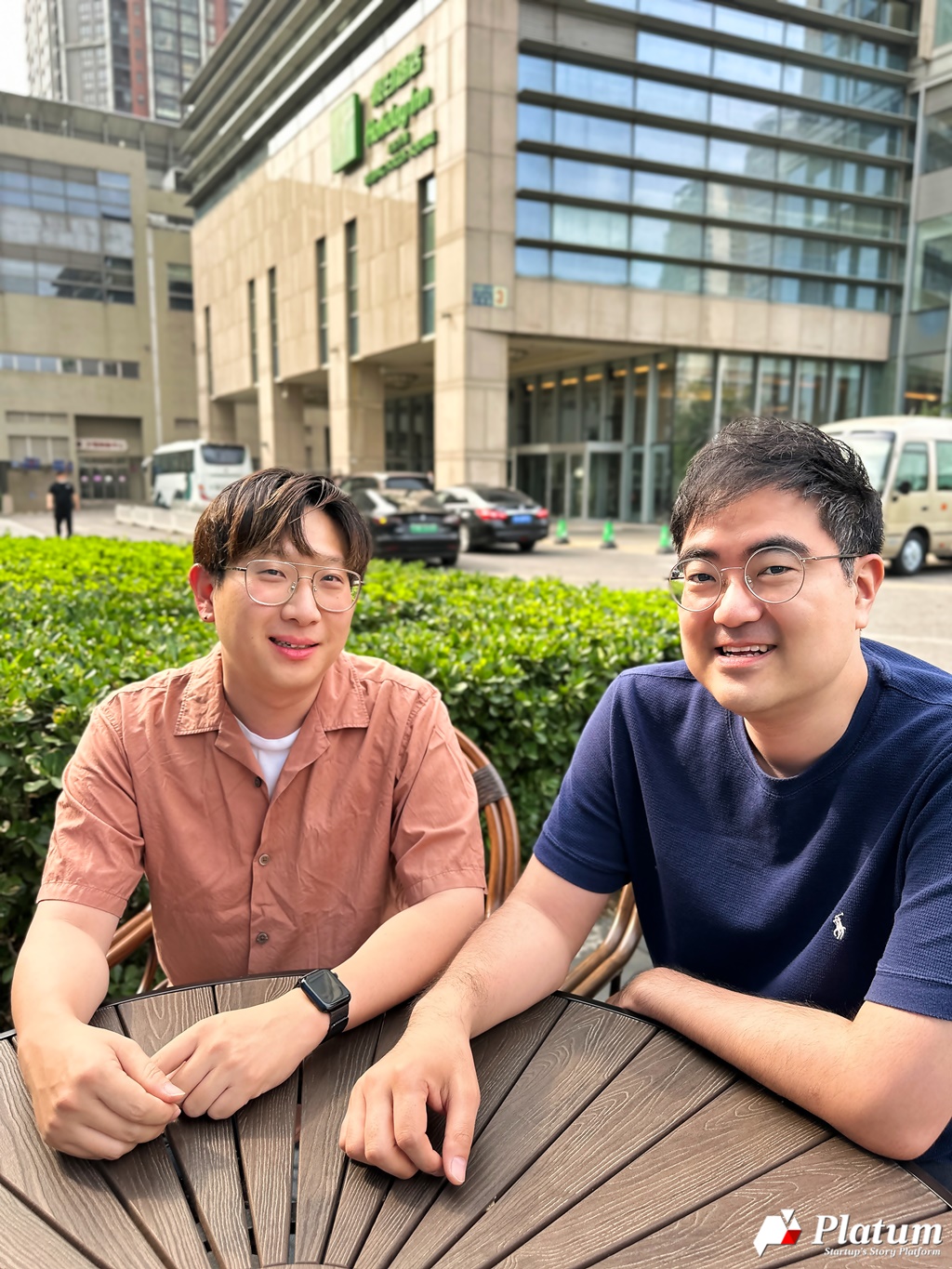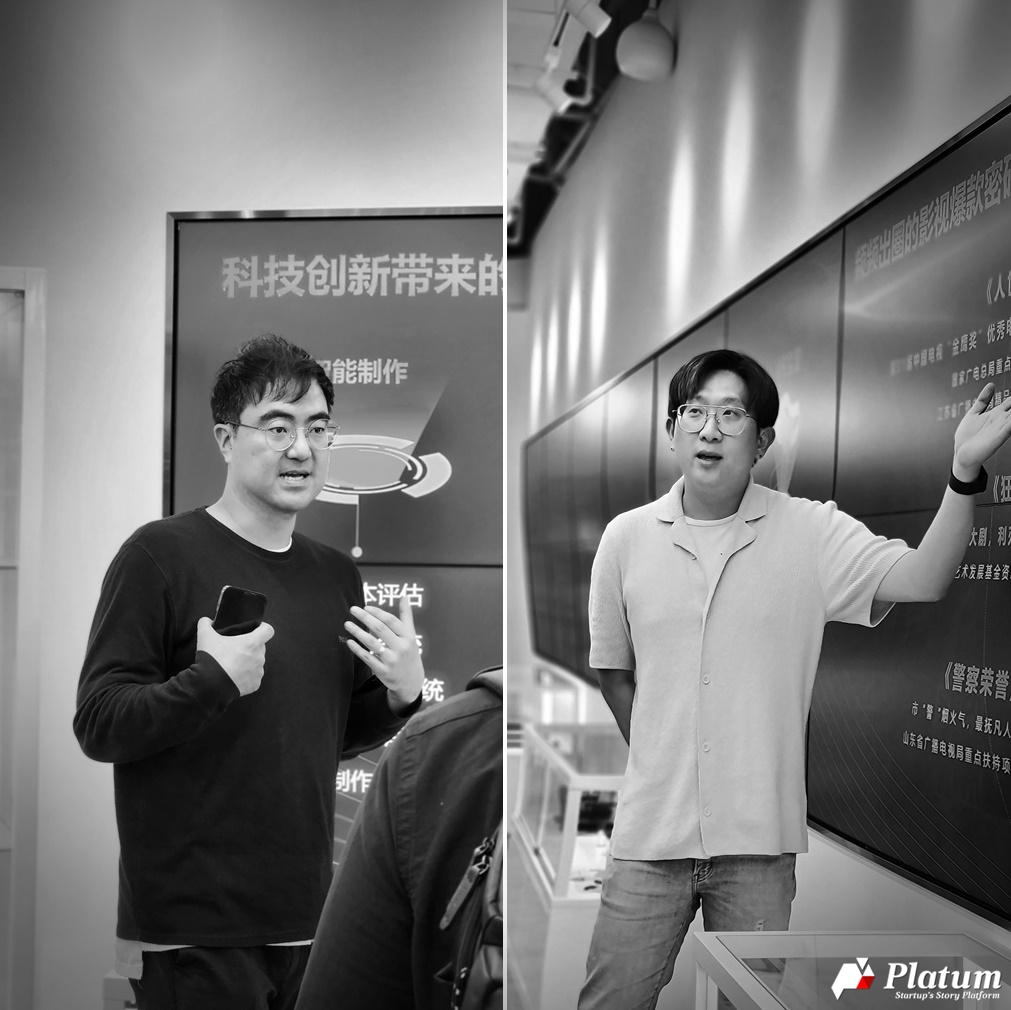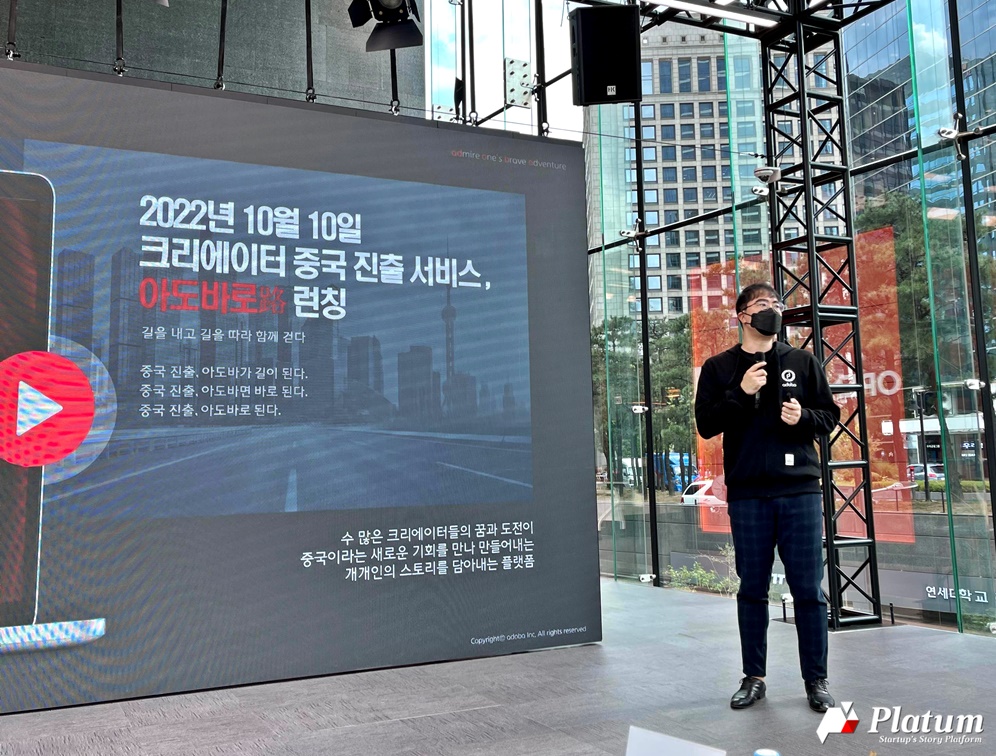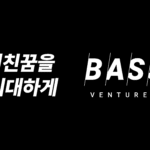
Content created by Koreans is mainly consumed by Koreans. So, YouTube in Korea is limited to a small market of 50 million. Even though YouTube creates the creators, they are trapped on YouTube. They need an exit strategy. Since there are no other alternatives in Korea, they have no other choice but to look for opportunities abroad.
Adoba, a cross-border platform for creators, aims to overcome these limitations through technology. It wants to create a “creator ecosystem” where global creators and brands can freely operate and collaborate in the global marketplace. Through Adoba, global creators can set up channels on Chinese platforms, publish content and settle revenue. This is possible because Adoba has content distribution agreements with 12 major Chinese online platforms.
Adoba has been helping local and global creators enter the Chinese market, bringing more than 550 local creators to China and operating more than 2,000 channels. In recognition of its business performance and potential, the company received KRW 1 billion in pre-A round funding in 2020 and KRW 4 billion ($3 million) in series A funding in 2021.
Adoba is led by CEO Junhan J. Ahn and Chengdu President Dae-il Park. Ahn is considered a China expert. After working in large companies, he went into startups and co-founded Encored Technologies, an energy big data company. In 2016, he sold his VR platform company to 87870, China’s largest VR platform, and then founded Adoba in 2019. Dae-il Park has entrepreneurial experience in Korea and worked for local companies in Shanghai, China. What makes him unique is that he is a Wang Hong (网红): Whang Hong is the Chinese term for internet celebrities) in China. Platum met them in Beijing.
– I see a lot of changes compared to the 2020 interview. The focus of the business has shifted from the MCN business to the technology platform.
Junhan J. Ahn (hereinafter referred to as “Ahn”): The direction of the company hasn’t changed. There is still a huge opportunity in China, and the essence of our business is to bring more creators to this market. We started this business because we believed that there was a business opportunity in the Chinese online platform market and that there were enough opportunities for foreign content creators. Initially, we found a win-win situation with Baidu’s Haokan Video. Baidu was a latecomer to the video platform and needed content, and we needed a platform to solve the challenges of foreign creators. The interests of both parties were aligned, and it worked well. Based on the know-how we gained, we expanded to other platforms.
But on the business side, we needed an efficient mechanism. Over the course of four years, we saw that 20% of the creators were getting a good ROI on their resources, but 80% of the creators were not, so we had to find a new methodology. As the number of creators and local platforms grew, the company’s workload grew exponentially, so we moved from MCN-style management, which requires human involvement to IT solutions. We interpreted the industry and redefined the problem.
We first looked at what we had. Adoba has the authority to allow foreign creators to appear on various platforms in China and be certified for originality and monetization. It can also authorize individuals to settle the revenue earned by creators after their activities. These two permissions are unique to Adoba in the world. We decided to make these permissions more accessible to creators. The result is Adobaro, which was launched in beta in October last year. At the end of June, we will launch the global version at VidCon (an annual convention for YouTubers, creators, fans, media companies and MCNs from around the world).
The big difference between four years ago and now is that we now approach the Chinese market through IT technology rather than management. Based on that, we can send creators from different countries in the global market to the Chinese market. The way of solving problems has changed. It doesn’t mean that we are giving up the MCN business. As I said, 20% of the creators can grow bigger with management. It’s a business that’s already doing well and can do even better with our help.
-In the early days of Adoba, you were referred to as a “China-specific MCN”.
Ahn: It’s true that China is the market we are focusing on We chose the continental market first to ensure that we have a favorable business position. But ultimately our direction is cross-border and cross-platform. If you can take a piece of content and put it on more platforms than just YouTube, there’s more opportunity for creators, and if you can repurpose content that’s already on YouTube, you can monetize it further. Even content that didn’t work on YouTube can find a home on other platforms.
In fact, even when you cross borders, it’s usually YouTube. This is even more true if you’re not in a market where YouTube is the only platform, but in a country where there are countless other platforms of YouTube’s size. For example, YouTube’s largest market is India, with 260 million users. In China, where YouTube is blocked, many platforms have between 300 and 500 million users. The combined MAU of the Chinese platforms Adoba works with is 5 billion, which is much larger than the Indian market. For these practical reasons, we targeted the Chinese market first.
We’ve already proven the South Korea to China part, and there’s an extension that goes from global to China. Creators in China will be able to go global through us. Eventually we will be able to go from global to global.
-When asked for numbers or results from the creators Adoba brought to China.
Ahn: In total, we’ve brought about 550 teams to the Chinese platform, and these creators have about 260 million subscribers on global platforms like YouTube and TikTok. There are also many creators who have already grown, such as Hey Jini. They have over 30 million subscribers in China and over 2,000 channels across 12 Chinese platforms that we work with.
We’ve done some data analysis internally and we’ve found that a single creator grows about three times faster on Chinese platforms than they do on YouTube. So overall, we expect to be able to grow to a similar size as YouTube in a year to a year and a half. We think it’s important to have multiple platforms, including YouTube. We’ve opened up the Chinese market not by choice, but by extension.
-How does Adobaro, which launched in beta in October last year, help creators?
Ahn : Adobaro combines all the modules that creators need to enter the Chinese market. In order for international creators to work on Chinese platforms, they need to meet strict verification requirements such as long-term visas and local bank accounts. Adobaro supports creators’ activities in China through a variety of services, including channel creation and revenue settlement services, platform guidelines and manuals, China trend newsletters, various materials (music, fonts, images, etc.) that can be used on Chinese platforms, and channel data dashboards. We’ve been beta testing it for over six months to see if it works. In the last three years we have helped over 300 teams enter China, and in the last six months, over 200 teams have entered the Chinese platform.
-Your hypothesis wasn’t right. Some would have worked, and some wouldn’t.
Ahn: The key to what worked is that it’s a significant cost saving compared to going into management. The cost per creator has gone down by a tenth, and the number of operations has gone down a lot because we don’t contract them individually. We have the technical tools to increase the number of creators in China.
But we also have a problem to solve. When we entered the Chinese market with only Korean creators, we could clearly see the limitations, so we knew we needed to expand our scope and go global faster. When we go global, our solution becomes more meaningful. For example, bringing American, Australian and European creators to China as MCN basis has a lot to overcome, including language and time differences. Management costs are bound to rise. But by going through Adobaro, we can save a lot of money. We’re convinced that we can achieve economies of scale with the technology solution rather than management, which requires a lot of human attention.
-You are launching the global version of Adobaro in June. What did you focus on during the preparation process – key features or highlights?
Ahn: What we wanted to see in the beta is the efficiency that comes with moving to the solution. In terms of numbers, we’ve had over 200 teams sign up in six months, so we’re doing well. When we launch the full version, we’ll be adding some more useful features.
Basically, we’ll give creators everything they need to access Chinese platforms. We’ll have all the features to run a local channel, including uploading content. They’ll also be able to see platform-specific data in real time. Most importantly, we’ve made it easy to get paid.
On average, it takes 6 months to 1 year to monetize on YouTube, and we think the same is true in China. Adobaro is a great tool, but it’s not perfect, so we need to complement it. So we are working on several different programs. In the three years that Adoba has been in China, 20 % of the creators that we’ve brought into the country have connected with local brand advertising. We’re looking to automate this a bit more by allowing brands to request ads from creators, and creators to pick and choose which ads they want to do. That’s going to be part of the general release.
Adoba wants to be a platform like Shopee, the Amazon of Southeast Asia. Shopee doesn’t have its own commerce, but it has a lot of commerce mall sellers within it. It has grown incredibly fast because it allows sellers to independently drive engagement between brands and customers. We’ve also made it possible for creators to upload videos to any platform, manage their data and get paid, all by connecting to Adobaro. It’s definitely the most tailored and suitable platform for China.
-You said that the number of domestic creators is not large. What is its share in the global market? Is it small?
Ahn: According to various reports, the number of YouTube creators in the world is about 50 million, and the number of Korean creators is about 100,000. That means there are about 100,000 people doing monetization activities. If you want to do a real business, you should target 50 million people, not 100,000. Korean creators’ content is strong enough for the Chinese market. However, from a business perspective, it is imperative to increase the number.
-What will it take for a quality creator economy to materialize?
Ahn: Ultimately, the key will be business relationships that allow creators to make more money. It is a reality that Korean creators don’t make KRW 1 million ($757) in a year. We need to provide more business opportunities for creators to create a quality ecosystem. That’s why we continue to test it. Last year we ran a music project, and earlier this year we collaborated with the creator goods platform ‘Oround’ to help creators monetize. The next thing we are preparing is crowdfunding and commerce. We plan to continue connecting creators with businesses they can do on the side.

-Adoba has a 40-person office in Chengdu, Sichuan Province. The Chengdu office has twice as many employees as the Seoul headquarters. What is the role of the Korean and Chinese offices?
Ahn: Initially, we had most of our organization in Seoul. Now we have a separate R&D organization in Chengdu. Solutions are developed, planned and operated in Chengdu. The same goes for partnerships, problem solving, and crisis response. What we’re experimenting with is operating as if our headquarters were in Chengdu. The Seoul headquarters is approached from a business perspective, with the concept of being the first local branch. Chengdu oversees solutions and platform partnerships, while Seoul is in charge of creator training, promotion, business, and sales.
-Why is the office in Chengdu?
Ahn: In China, we call Beijing, Shanghai, Guangzhou and Shenzhen first-tier cities. Then there are large cities that we categorize as “new first-tier cities,” and Chengdu is one of them. Chengdu is a metropolis and a consumer market with a population of over 20 million. One of the nicknames of Chengdu is “the castle of Wang Hong”. There’s a lot of Wang Hong activity, but there’s also a lot of purchasing power for what they sell. That is why we chose Chengdu.
-Dae-il Park is in charge of subsidiary operations. He is responsible for overall service planning and design as well as platform partnerships.
Ahn: Mr. Park has a history of working for Chinese companies and starting his own business in Korea, most notably as a popular Wang Hong (aka “Ttie”) on Chinese video platforms. There is an annual award for foreign creators in China, and Mr. Park was selected as an outstanding Wang Hong for three consecutive years from 2021 to 2023.
There are a lot of qualities that a general manager of a company should have. From a business perspective, it could be being good at management, it could be being financially savvy with strong numbers, it could be being patient, or it could be being a good strategist. Mr. Park’s greatest strength is his understanding of the creator economy. The biggest part of the Chengdu office is R&D, but it’s also very important to build and maintain relationships with Chinese platforms on the ground. The experience of working directly with platforms as Whang Hong is very helpful and competitive.
-How did your relationship start?
Ahn: Even before we started doing business together, we exchanged views on the Chinese market. When Mr. Park started a company in Korea, I advised him as a senior founder. The COVID-19 crisis brought us together. Due to the nature of our business, we need a lot of Chinese employees. However, due to various restrictions on hiring foreigners in Korea, we could not hire as many as we wanted. After much deliberation, we decided to set up a subsidiary in China and transfer various functions there. However, because of the Corona pandemic, it was difficult to do it directly. While I was thinking about it, I had an online conversation with Mr. Park, who was in China, and suggested that we do it together. He was also interested in the creator industry, so the timing was perfect. As a result, thanks to Mr. Park, the results have exceeded our expectations.
-What brought Mr. Park to Adoba?
Dae-il Park, President of Chengdu (hereafter “Park”): Creators have a vague fear of MCNs. That’s because they don’t see the benefit of belonging to an MCN. I thought that what MCNs could do in China and Korea was pretty much the same, but when I was working as a creator, other creators and followers often mentioned Adoba.
It’s a little different in China, where the followers are more concerned about the creators. It’s like, “Are you living off this?” “You don’t have that many views, are you okay?” “I’ve been following you for a while, but why don’t you have more followers, I’m so worried.” There are so many comments like that. Followers also give creators a lot of suggestions for things their subscribers might like, and even write scripts for them. I also got a lot of comments that I wasn’t progressing because I wasn’t in an MCN, especially since I’m Korean, and they told me to join Adoba, which is a Korean MCN.
So, I had such a good impression of Adoba, and during the pandemic, I started talking to CEO Ahn. We had a relationship in the past, and when I heard that they were opening a subsidiary in China, I thought I’d give it a try. I saw that Adoba’s business direction itself made sense, regardless of everything else.
– Being a lone creator and running an organization are two different roles. You’ve created an organization of 40 people and there must have been many twists and turns.
Park : The number of people grew when I hired one or two people for the company. My experience in a similar role in my previous job in Shanghai was helpful. During the recruitment process, I often met candidates who recognized me as Wang Hong.
Ahn: There is a Chinese MCN called Luhnn(如涵). It was an MCN that was successfully listed on NASDAQ, and behind it was Zhang Dayi (張大奕), a famous Wang Hong. A single creator played a big role in the listing. Similarly, Mr. Park has high ambitions for the creator business. He will share the knowledge and experience he gained as Wang Hong with other creators.
-By the way, Mr. Park is a well-known creator of foodie content. Is there a reason why you decided to focus on food?
Park: It’s not content that I eat a lot, but I look for delicious things. It’s a little bit of gourmet content that I explore. In the past, I ran a Naver blog in Korea, and I also covered food content. Chengdu is good because there are so many things to eat.
-Mr. Park also started a business in Korea. It was a food delivery business for Chinese people in Korea.
Park : It was a very hands-on business. However, the creator business is also traditionally labor-intensive. That’s why I strongly agree with Mr. Ahn’s idea to solve this industry with IT solutions.
Ahn : It’s hard to control the cost structure because it’s a very manual business. This is probably the reason why the business of most MCNs has become difficult. If we can solve it with IT systems and solutions, we see a lot of room for growth.
– What do you think is Adobo’s greatest strength as a creator?
Park : As a creator, it’s a very welcome service. It takes care of everything from start to finish at once and creates an environment where you can focus on creating more. Wang Hong in China also said that the ability to leverage global multi-platforms with a single piece of content is appealing.
-Mr. Ahn runs the business from an IT perspective, while Mr. Park has an emotional approach from a creator’s perspective. What kind of synergy do you have?
Ahn: I’m an engineer by background, so I think in a data-driven way. How to innovate the creative industry with IT is the direction of my thinking. We want to take data, process it and turn it into a system. But there are parts that should not just be solved functionally. That’s where Mr. Park comes in. He knows what features creators like and what they really need. This is the foundation on which Adobaro is built as a realistic solution that creators can embrace.
-Is there a possibility of a platform like Adobaro in the future?
China is a difficult market to enter, no matter how good the technology or solution is functionally. Adoba has been in this market for four years, and we’ve had to go through a lot of challenges and build experience and technology along the way, and I think that’s something that can’t be easily gained or replicated. With that as a foundation, we now have the space to look beyond China to the rest of the world.

-I recall that you have raised a significant amount of investment for 2020. I’m sure there will be additional investment needs to fuel expansion. Do you have any financing plans?
Ahn: We’ll have a global launch in June, and then we’ll have the numbers for a while.
It’s only meaningful if the performance of the transition from traditional MCN management to IT solutions, specifically the results achieved by the Global-to-China team, exceeds the results achieved by the Korea-to-China team. When this difference is evident, it means that it is an opportune time to seek additional funding.
Our business is to seamlessly launch creators across platforms and build businesses with the impact they create. The premise is that we need to achieve economies of scale. Compared to the entertainment industry, the MCN industry is not fed by one or two or a few success stories. There has to be a methodology to increase scale, solutions to give creators more opportunities. If we can prove with numbers that we can scale out, we’ll have crossed a big hurdle.
-I have heard that local and international VCs have been hesitant to invest in MCNs recently.
Ahn: We are creating a solution that addresses the underlying reasons why MCNs are struggling. Of course, we shouldn’t just say it, but we want to prove it by the market’s response.
-Adoba is a company that seized opportunities by building a strong Great Wall in China. On the contrary, there were also difficulties due to prejudice against China.
Ahn : We’ve had two successful investment rounds in Korea. We were able to get to that point because we met good VCs and partners. Even those who didn’t invest appreciated our hypothesis and validation process. But in the end, the reason they didn’t invest was that our business model in China made it difficult for them to invest. There is a common perception that doing business in China is uncertain and risky.
We needed a solution to this problem. We have a principle of doing business directly in China. There is a perception that doing business in China requires a local to be in the middle. That’s not wrong, but it’s not 100% true. It’s not uncommon for someone to be in the middle, which makes the risk much higher. Adoba has direct partnerships with 12 platforms in China. We don’t go through anyone else locally, but we have a structure that allows us to put our creators directly on Chinese platforms and make the payments. That’s a strength that we’re proud of. We’re still learning about the Chinese market and how best to deconstruct and reduce risk.
-With the global launch of Adobaro, international creators will be able to enter the Chinese platform. Wouldn’t companies and brands also be able to enter China?
Ahn: That’s right. That’s what we’ve been testing in Seoul, and we’ve come to the conclusion that there’s a real need. There are a lot of companies that want to follow the path of creators and content that have gone to China, and there are a lot of brands that want traffic from creators. What brands have been doing is working with Wang Hong in China, which hasn’t been very successful. Adoba has proposed a way to work with local creators who can communicate freely, and it has worked well. I think this model can be replicated in the US, Europe and Southeast Asia.
-Mr. Park oversees R&D for the Adoba business. What is your vision for the future of the company?
Park: What we are currently pursuing is a ” foreigner-only MCN” that is different from Chinese MCNs. After that, we want to become the number one MCN in China. Right now, we are importing and uploading content from overseas, but I believe that if we gather foreigners in China to create content in the future, it will be more popular. We have a plan to become a locally specialized MCN.
-What does Mr. Ahn see as Adobo’s future plans?
Ahn: We’re going to take the direction of the company from the perspective of an IT company. We will give creators free access to a global platform through our solution called Adobaro. We will also provide various programs that are connected to businesses to realize a true creator economy.








댓글 남기기